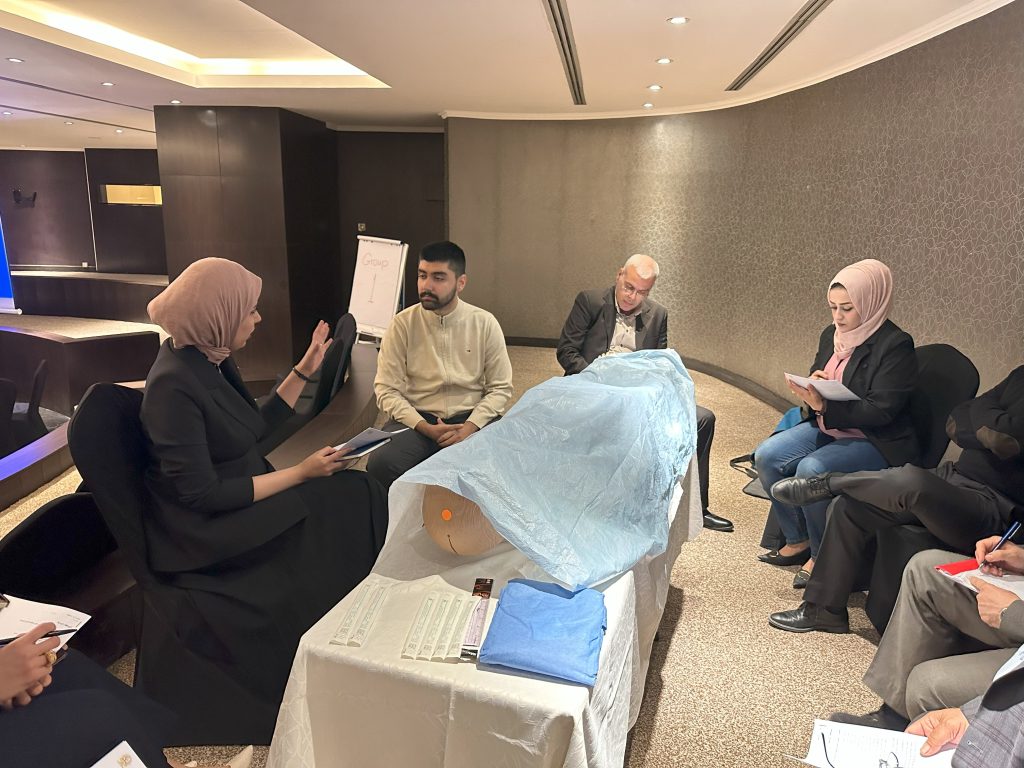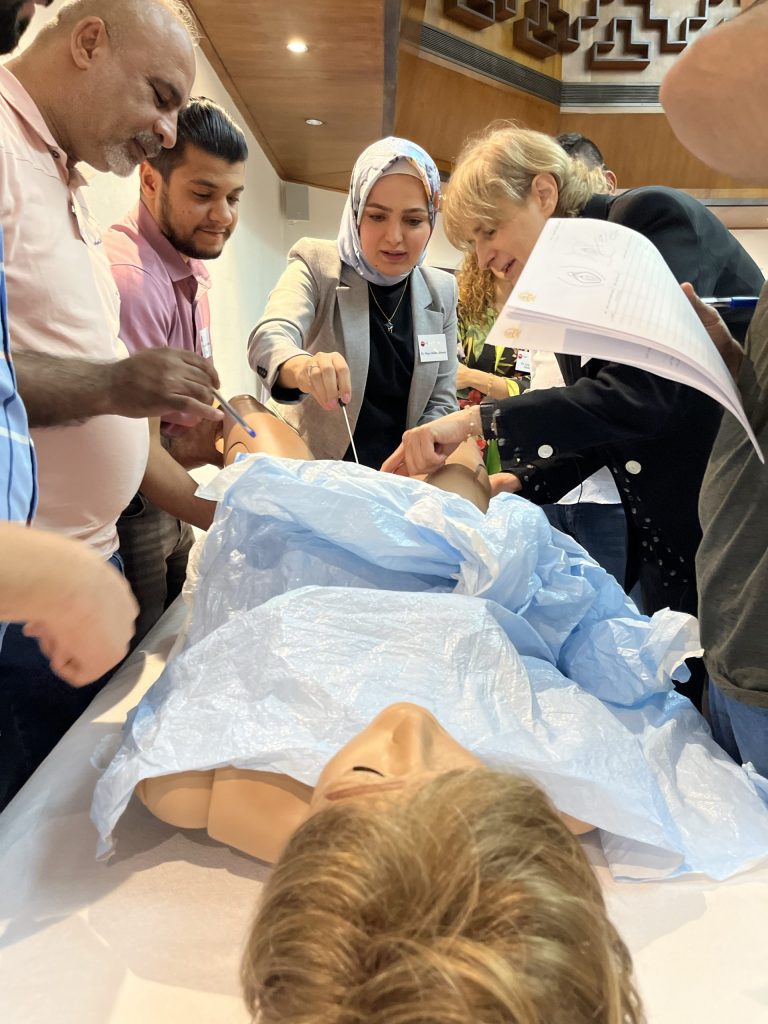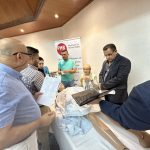During its 2014 offensive, ISIS waged horrific violence in Iraq. ISIS targeted religious minorities, including the Yazidis, who suffered brutal attacks on their communities. Thousands of Yazidi men, women, and children were killed, forced into flight, or abducted, raped, and enslaved. Today, ten years later, most survivors are still waiting for justice.
Recognizing the gaps in the Iraqi medical-legal system to respond to crises like this, Physicians for Human Rights (PHR) and the medical-legal sector in Iraq have partnered to improve it. The partnership brings new expertise and training to the country’s forensic doctors to help the Iraqi forensic professionals better conduct thorough investigations and build capacity to address such violations. The collaboration has yielded the introduction of a new forensic medical form: a powerful tool that helps to standardize survivor-centered documentation and improve access to justice for survivors of sexual and gender-based violence, as well as conflict-related sexual violence.

Embarking on a Partnership for Change
PHR’s forensic capacity work in Iraq began in 2017 in response to concerns raised by local partners on the need to expand forensic capacity in the country. PHR partnered with the Medical-Legal Directorate (MLD) in Baghdad, a government bureau affiliated with the Ministry of Health. The MLD oversees medical-legal institutes in 14 governorates across the country, facilities tasked with conducting forensic examinations of survivors of torture and sexual violence, and regularly produces forensic reports to be used as evidence in court. By 2021, PHR and the MLD recognized that the lack of a standardized tool and practices in forensic documentation across the country had led to inequitable outcomes for survivors. At the time, methods and procedures used by forensic doctors in Iraq varied widely depending on their qualifications, experience, and attitude towards survivor-centered approach. Likewise, the completeness – and even accuracy – of documentation varied by location. After extensive consultations with forensic doctors, legal and judicial experts as well as international experts; it was agreed that if survivors were to access equitable and evidence-based forensic documentation process, a common forensic medical form – that met international standards – was the key.
To create a new form, PHR and the MLD jointly produced and piloted numerous drafts, conducted multiple validation sessions with physicians in Iraq as well as international health professionals, and held a series of workshops with Iraqi medical and legal experts to ensure the form reflected Iraqi cultural context and legal frameworks.
To date, PHR has trained approximately 85 percent of forensic doctors across the country, including the Kurdistan region of Iraq.

A forensic doctor from Mosul was among those consulted and trained in the process. “I had doubts when we started the training with PHR,” he said. “I did not think implementing the form was feasible, since we receive many cases every day, and the new form is long and takes time to fill out. But after the training, I realized how straightforward it is. Once the doctors get accustomed to the different sections, the form should organize the way we collect information and evidence and will allow us all to do this systematically. We just need to practice using it more.”
Another doctor at the MLD shared similar reflections after implementing the forensic form. “We take the time to get informed consent and go through the examination according to the form, the survivor becomes more at ease with the process. They collaborate and share more details [with the clinicians] about what happened to them.”
To date, PHR has trained approximately 85 percent of forensic doctors across the country, including the Kurdistan region of Iraq. In early 2024, the MLD in Baghdad formally started implementing the new forensic medical form. To measure the progress of the form’s adoption, PHR and the MLD conducted a joint assessment to monitor the provision of survivor-centered care, implementation of the form in clinics and hospitals, ongoing evaluation and improvement, and sustainability.
The outcomes of this assessment are guiding PHR and the MLD, along with other relevant stakeholders, to bridge existing gaps to transform the MLD’s practices, structure, and policies to support a survivor-centered approach to forensic documentation of sexual violence and torture moving forward. Some areas of focus include; the attitudes and the practices of forensic doctors and staff interacting with survivors to ensure that they center survivors’ needs, avoid discriminatory behaviors, and respect survivors’ dignity, privacy, and confidentiality.
Looking Ahead
A comprehensive and survivor-centered implementation of the form will support justice for survivors; although there is the need for a multisectoral collaboration and understanding of the best standards to document, collect, preserve, and analyze forensic evidence among investigative authorities. Building on PHR’s successes with this model in other countries, PHR and the MLD will organize a series of multisectoral workshops to advance the coordination between the judicial, investigative, and medical sectors. These workshops will help forensic doctors to conduct comprehensive documentation of physical and psychological evidence; support judicial authorities to refer cases, interpret, and use forensic evidence following best standards; and, generally help all stakeholders to clarify roles and responsibilities.
It will take time for Iraq to ensure all survivors of torture and sexual violence can access the medical and legal support they deserve. However, the ongoing collaboration is already providing better experiences for survivors and strengthening national justice mechanisms. For example, in March 2024, the MLD opened a new Clinical Management of Rape Unit tasked with conducting forensic documentation of survivors of sexual violence.
Creating the forensic medical form and strengthening the capacity to document physical and psychological evidence of conflict-related sexual violence are crucial elements to build justice and accountability, but this cannot be done without a clear legal pathway. To address conflict-related sexual violence, the Iraqi authorities need to develop the capacity of the Iraqi judicial system. The Iraqi legal and judicial system should incorporate international elements to prosecute and address the crimes that amount to war crimes, crimes against humanity, and genocide.
This project is implemented with the support of the Peace & Stabilization Operations Program of the Government of Canada.

